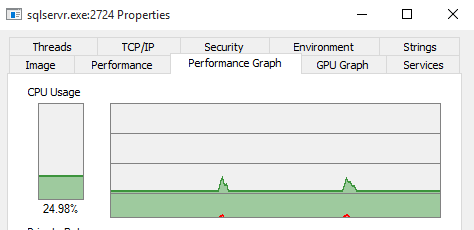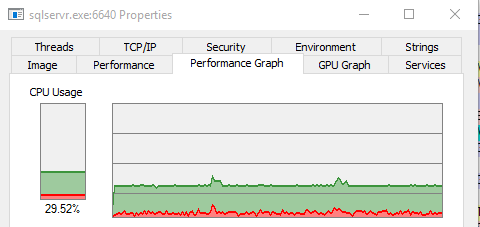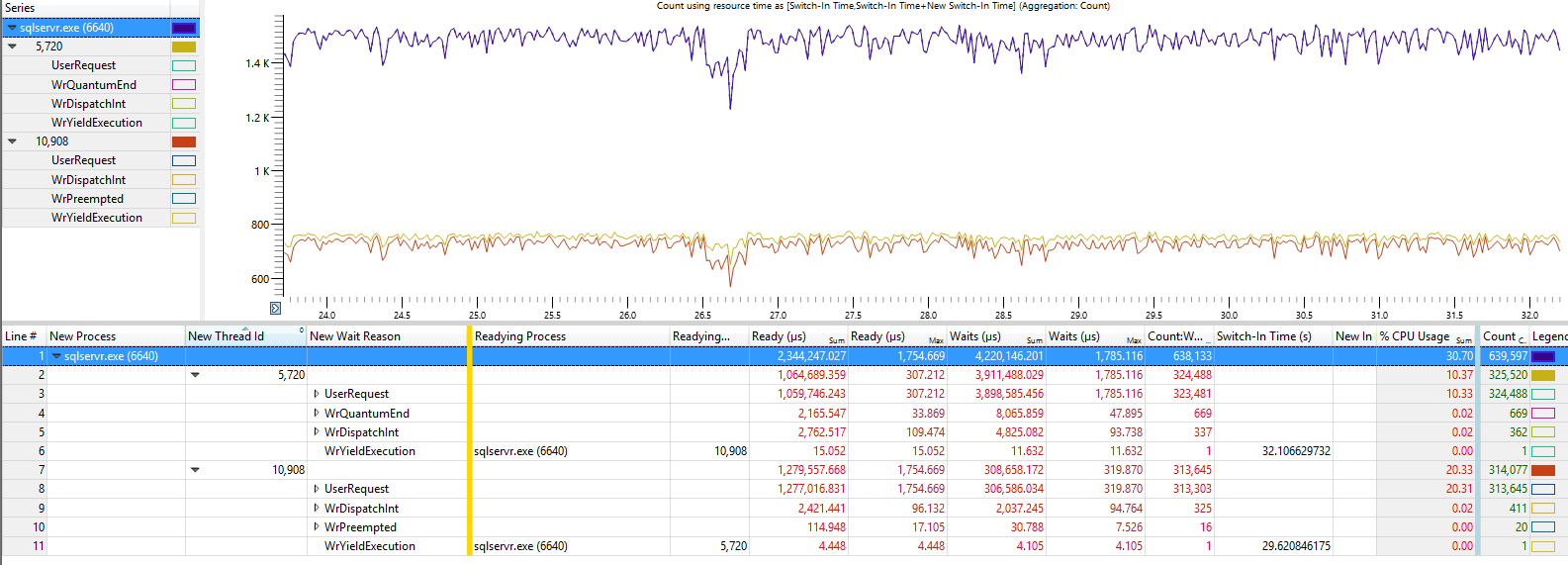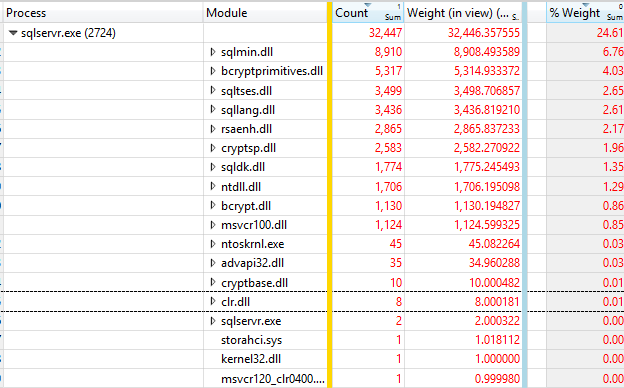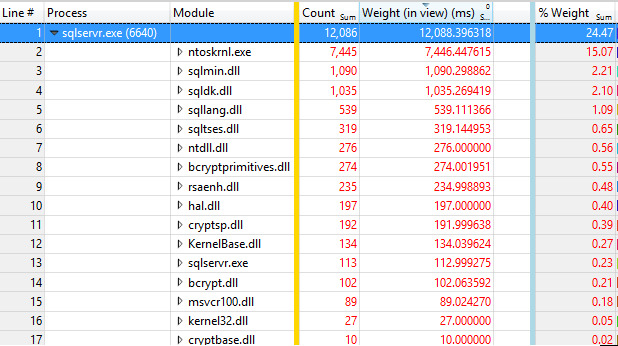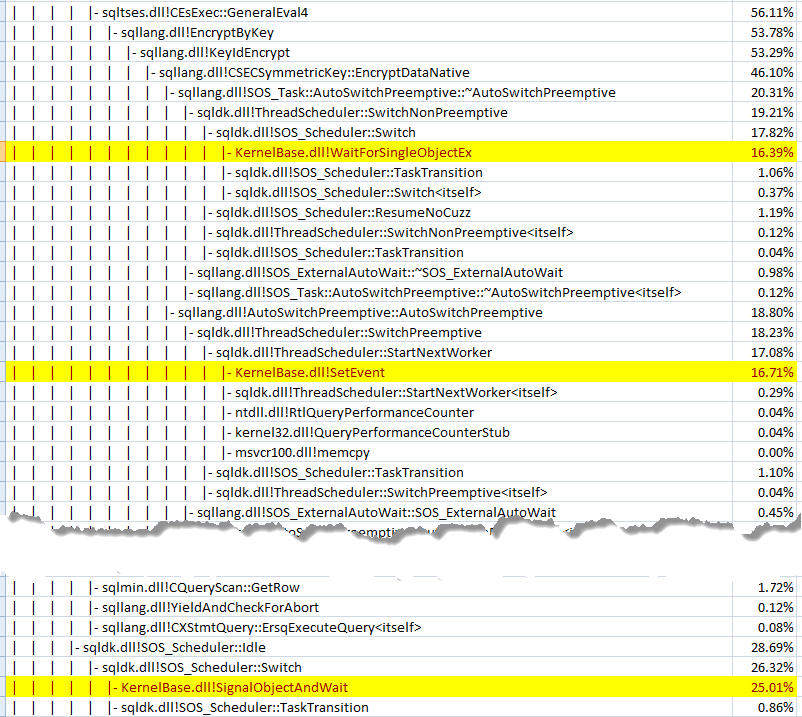Edit: I just noticed that there is a KB article FIX: A query that uses the DECRYPTBYKEY
function takes a long time in SQL Server 2014 but I have that installed and it doesn't appear to change the original conclusions below.
Running the following code in both SQL Server 2012 (11.0.5343.0) and 2014 (RTM) on a quadcore (Intel Core i5-2320) X64 desktop machine running Windows 10.
OPEN SYMMETRIC KEY MySymmetricKeyName DECRYPTION BY CERTIFICATE MyCertificateName;
DECLARE @B VARBINARY(100);
WITH t
AS (SELECT ROW_NUMBER() OVER (ORDER BY @@SPID) AS article_id
FROM sys.all_objects o1,
sys.all_objects o2,
sys.all_objects o3,
sys.all_objects o4)
SELECT @B = ENCRYPTBYKEY(KEY_GUID('MySymmetricKeyName'), CONVERT(VARBINARY(100), article_id))
FROM t
And looking at it in Process Explorer
2012
![enter image description here]()
2014
![enter image description here]()
Two things become immediately apparent.
The 2012 version is using less CPU and is maxing out a single core. The 2014 version is using more than a single core and has significantly more kernel-mode activity (red)
The Process Explorer "threads" window shows
2012
![enter image description here]()
A single thread is monopolizing the scheduler.
2014
![enter image description here]()
Here the work is being performed by two threads (thread 3212 is running the idle task sqldk.dll!SOS_Scheduler::Idle).
Tracing the 2014 process shows that SQL Server and these two threads encounter a lot of context switches (trace taken at different time than previous screen shot hence differing thread ids)
![enter image description here]()
Tracing the two processes with Windows Performance Toolkit shows some significant differences in time spent in different Modules
2012
![enter image description here]()
2014
![enter image description here]()
I'm not sure at the moment why the 2014 version reports 25% CPU in this view vs 30% in others but anyway it is readily apparent that time spent in ntoskrnl.exe has increased dramatically between versions and now 60% of time is spent in code in that module. Time spent performing the encryption has of course dropped correspondingly.
And attaching the VS code profiler the 2012 version looks like this and the 2014 like this.
So it looks as though 2014 has additional logic to stop this hogging the scheduler and it gets switched off more frequently as highlighted by the additional items below.
![enter image description here]()
(Compared with 2012)
![enter image description here]()
Trying the following in both versions to perform the operation 1 million times...
SET STATISTICS TIME ON;
DECLARE @B VARBINARY(100);
OPEN SYMMETRIC KEY MySymmetricKeyName DECRYPTION BY CERTIFICATE MyCertificateName;
DBCC SQLPERF("sys.dm_os_wait_stats", CLEAR);
WITH t
AS (SELECT ROW_NUMBER() OVER (ORDER BY @@SPID) AS article_id
FROM master..spt_values v1,
master..spt_values v2
WHERE v1.type = 'P'
AND v2.type = 'P'
AND v1.number BETWEEN 1 AND 1000
AND v2.number BETWEEN 1 AND 1000)
SELECT @B = ENCRYPTBYKEY(KEY_GUID('MySymmetricKeyName'), CONVERT(VARBINARY(100), article_id))
FROM t
SELECT *
FROM sys.dm_os_wait_stats
WHERE wait_type IN ( 'PREEMPTIVE_OS_CRYPTOPS', 'SOS_SCHEDULER_YIELD' );
2012 (CPU time = 2344 ms, elapsed time = 2383 ms.)
![enter image description here]()
It can clearly be seen that whilst the PREEMPTIVE_OS_CRYPTOPS wait type does exist in 2012 it is not used in this case.
Instead it looks as though the query more or less monopolises the scheduler (though still yielding voluntarily at the end of its 4 ms quantum - 4 * 597 = 2388)
2014 ( CPU time = 8188 ms, elapsed time = 10569 ms.)
![enter image description here]()
Whereas for 2014 every invocation of the ENCRYPTBYKEY function encounters this wait type and in this case it (combined with the context switches) added 8.2 seconds to overall elapsed time.
The call stacks for some of the more time consuming kernel calls are highlighted below.
![enter image description here]()
I also tried one other experiment
2014 - SQL Server affinitised to single CPU
(CPU time = 4500 ms, elapsed time = 6648 ms.)
![enter image description here]()
Timings here fell somewhere in between the 2012 performance and the 2014 non affinitised performance where the code executed across multiple different cores.

